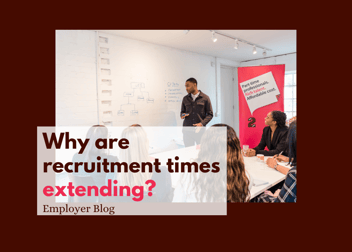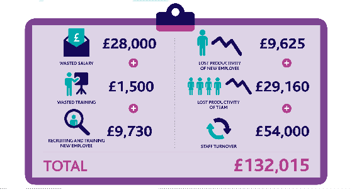Finding Recruitment Success in a ‘Candidate Market’
‘For the first time there are ‘fewer unemployed people than job vacancies’ according to the Office for National Statistics (ONS). That’s a stark indicator of today’s jobs market. We’re also seemingly in the midst of ‘The great resignation’ as people who resisted changing jobs during the pandemic begin to look at other career options.
Whatever the broader economic and industrial indicators are telling us, on the ground we are seeing greater movement, a shortage of quality candidates and a notable change in candidate’s expectations and behaviours. Many of Ten2Two’s candidates are drawn from our unique community of professionals and they have been talking to us about what they’re experiencing and how their expectations of their future employer is changing.
So, how can you increase your chances of finding recruitment success in a candidate market? Here are the areas you can focus on to ensure success.
1 – A more effective recruitment process
Last week, a candidate withdrew from a role she had been offered because it took the employer four weeks to send her an employment contract! Never mind losing the person they wanted, that’s a lot of time and effort wasted because of a lax process. Great candidates are dropping out of recruitment processes in favour of other roles due to:
- Delays between application close date and interview dates
- Procrastinating when providing feedback to candidates post-interview
- Setbacks in extending an offer to the preferred candidate; and
- Delays in sending an employment contract for signature
These delays are allowing other companies to jump in and secure candidates ahead of the laggards. They’re also giving the wrong impression of you as a company, your effectiveness, culture and it simply says ‘we don’t really value or want you’.
Our recommended approach:
- If you’re in HR, set some ground rules and standards for each stage of the hiring process with your managers on their levels of responsiveness – and report against them
- If you’re a leader in a smaller business or a hiring manager, prioritise the recruitment process. And allocate the time you need to review and select from your shortlist and for interviews in advance. (It’s a difficult conundrum. You’re probably very busy, which is why you’re recruiting. But by not prioritising the recruitment because you’re busy, you’re just delaying the fix!)
2 – How flexible is the role?
Expectations surrounding flexibility has notably increased over the last 12 months. And importantly, the rationale behind the design of the working pattern is being evaluated by candidates. Whether it be a hybrid working pattern, a time-shift or compression of the working day or elements (if appropriate) of part-time working, candidates are expecting flexibility. They’re also expecting the working pattern to match the requirements and demands of the job.
Our recommended approach:
- During the design of a new role or the review of an existing role, deliberately assess the options for flexibility. You may have one preferred option, but try to have several alternatives that can work for the role and the company if possible.
- Your preferred candidate may have a request you haven’t considered or may be slightly outside of your preferred working pattern. The approach you take is critical to securing or losing the perfect candidate. Can you meet them half-way or agree some compromise? Few candidates are rigid in the flexibility they’re seeking. The end result could be a poorer match for your needs so we recommend an open discussion. Note that we’re talking about options that exist within your flexible working policy to maintain structure and consistency!
3 – A smart and effective video interview
You may be using a selection process that includes interviewing by zoom or teams call. The majority of our clients are still using video for at least the first interview and following up face to face for a second if required. Candidates are now happy to interview in person, but if colleagues are not available on the days and times you need then you’re facing needless delays. So video is now an essential tool in the recruitment process – as it has been for remote or international roles.
Our candidate community have often fed back on the quality of video interviewing – good and bad. Effective and well-managed interviewing is clearly important in establishing the credibility of an organisation, the interviewer. And it ultimately affects the attractiveness of the job itself, so a poor process will result in lost candidates.
Our recommended approach:
- Think through the approach you’re taking to video interview. Logistics and structure are important. Are you first on the call? Have you prepared (and talked through) an agenda? Is the environment right? Do you have a back-up plan in case video fails?
- It’s hard to recreate an in-person environment but try to replicate some of the characteristics. Clients have started to build in time for some informal questions and a chat so they can get a more rounded impression of the candidate. They’re also allowing specific dedicated time at the end of the interview for questions from the candidate.
- Read our top ten tips in our dedicated blog on the topic and check your approach.
4 – Fit the person to the job…
…or the job to the person? The answer is a bit of both. Outstanding candidates that more than meet the overall requirements of the role are sometimes rejected because they do not 100% meet the functional spec. This is where some additional flexibility in job design is also needed.
Our recommended approach:
Evaluate the role to understand which elements of a job could be reassigned to others and/or additional requirements be assigned to the job based on the qualities of your preferred candidate. If a person is a great collaborator or leader but is not a great administrator, can the admin be handled elsewhere? This can be complex but if you’re confident you can successfully redesign elements don’t let that great candidate go.
5 – The perfect fit conundrum
Finally, there are many occasions where a perfect candidate clearly rises to the top of the pile during the preparation of a shortlist for interview. Given the apparent shortage of outstanding candidates and the volatility of recruitment right now, is it worth quickly interviewing and even confirming a great candidate ahead of other interviews taking place or do you wait for the process to run its full course. Running the risk of an agile competitor jumping in and gazumping you for the person you knew would be ideal?
Our recommended approach:
- It’s usually a risk to short-circuit the process. But in the current climate it’s paying to move quickly if you feel a candidate is absolutely hitting the mark and there’s a strong cultural fit. Psychometric testing alongside an interview is a good back-up. Ensure references are taken but don’t look back and think ‘what if?!’
- The team at Ten2Two can help speed up the process. We can help you find the perfect fit if you’re looking for hard-to-find candidates, you’re busy or if you’re an inexperienced recruiter. We specialise in finding the perfect professional for all forms of flexible and part-time roles.
Contact jane@ten2two.org for a chat.


 Back to resources
Back to resources 6 min read
6 min read








